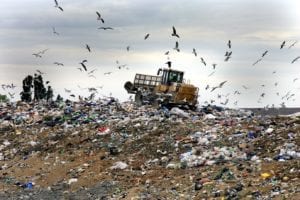Waste-to-Energy (WtE) technologies produce energy by processing solid, liquid and gaseous waste streams using either thermal, physical or biological methods.
It was determined that in 2014 a waste quantity of approximately 8 212 496t would be generated in the Western Cape (WC), with MSW (46.8%) being the largest contributor, and the City of Cape Town (CCT) generating more than 60% of the total waste. An accelerated green model determined possible fractional waste uses of 5%, 45%, 40% and 10%, attributed to landfilling, reuse/recycling, WtE and composting, respectively.Total net CO2 eq. emissions reduction of 13 472 164t was calculated from the model, with the biggest contributor being Non-Recyclable MSW (34.9%).
In conclusion, it was calculated that biological WtE technologies would be the most prevalent by 2040, with a share of 82% of the total net CO2 eq. emissions reduction, and the CCT would be the biggest role-player in enabling an accelerated WtE economy. Download technical paper here.




